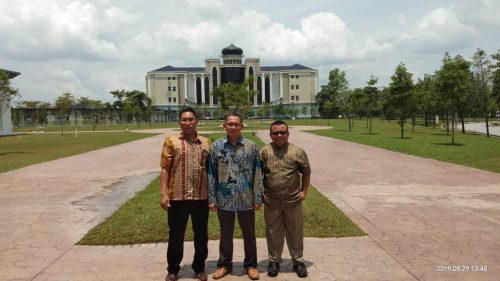OPINI — The Rector of IAIN Parepare. Dr. Ahmad Sultra Rustan, M.Sc. gives assignment to two doctoral researchers; Dr. Ali Halidin, M.pd.I and Dr. Abd. Rahman Ambo Masse, M.Ag, for conducting International Collaborative research at the University of Science and Islam Malaysia (USIM).
In his release from Malaysia, Dr. Ali halidin, M.pd.I, expressed his highest gratitude to the MORA-Diktis of the Ministry of Religion of the Republic of Indonesia as well as the rector of IAIN Parepare and staffs who have given permission and support for the research team to carry out this international collaboration which would be certainly useful for academicians of IAIN Parepare. This was agreed by the head of the research team Dr. H. Abd. Rahman Ambo Masse.
These researchers plan to stay for a week in Malaysia, it would be searching of data and research materials, starting from a number of experts at USIM and then to the Malaysian Hajj Saving Models, “Tabung Haji” in Kuala Lumpur.
They had previously searched several materials and data in Jakarta, arranging from the Hajj technical implementation bureau in the Indonesian Ministry of Religion to BPKH members and their supervisory boards, including interviewing several experts, such as Dr. Masudi Syu’ud and Dr. Rahmat as member in charge of investment planning for Hajj financial funds at BPKH.
The research will start for a year starting from the beginning of April to November, 2019. This Collaboration will examine in detail the investment management of the pilgrimage funds between Indonesia, managed by the BPKH (Hajj Financial Management Agency) and the Malaysian Haji Savings Institution. This research is an entirely competitive research assistance grant from the Ministry of Religion MORA-Diktis RI 2019 allocation. These researchers will return in October 2019 and will carry out the exposure of research results together with the implementation of AICIS in Jakarta.
The problem of Hajj investment is a very urgent matter to be known by the public, as it relates to the pilgrimage fund of prospective pilgrims which are still in the waiting list. In Indonesia, this is reasonable, considering the financing of pilgrims, previously using the system of Ponzi (taking) savings funds pilgrimage waiting list the last of two years from the finance pilgrims in the early years which had already been far in advance to register.
In contrast to Malaysian hajj savings model that have succeeded and successfully utilized hajj funds in the form of initial deposits to be invested in the sharia business sectors, the beneficiaries are returned to people who are prospective pilgrims, so the cost of hajj become cheaper in Malaysia, including building religious facilities, means of education and other public facilities.
BPKH is a non-structural management body formed and managed in responsibility to the President, so that the chairperson of this board is held by the Minister. BPKH, after being formed 2 years ago, have a huge responsibility, as it manages 115 trillion hajj funds which saved in national banks to be used for sharia investment capital and its all purposes.
All profits of its investment would be about to reduce the future cost of hajj. Pertaining to the expenditure calculation between real cost and income fund, the Indonesian hajj costs 35 million must be paid for each prospective pilgrim, the real cost, however, in the implementation and whole expenditure of the Indonesian pilgrimage, from embarkation to Haramain and back to embarkation, requires 75 million funds for each Indonesian pilgrims.
If the pilgrimage funds in the waiting list do not manage well in the hajj investment as implemented by Malaysian’s Tabung Haji, which already adheres to open access management, it will be, one day, become a huge problem for prospective Indonesian pilgrims that increase annually.
BPKH has invested until now lots of capitals, for instance; the sale of SBSN and Sukuk, also provided assistance in the construction of educational facilities and infrastructure of Islamic and private tertiary institutions, meanwhile the conditions, provided by the BPKH supervisory board can only use the pilgrimage deposit fund for just two years initial, which amount to about 3.7 trillion rupiah.
This is likely tiny amount indeed but will continue to be increased in future and would be a better prospectus, in turn to provide the convenience for the next prospective Indonesian pilgrims. (*)
By : Dr Ali Halidin













